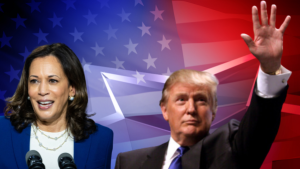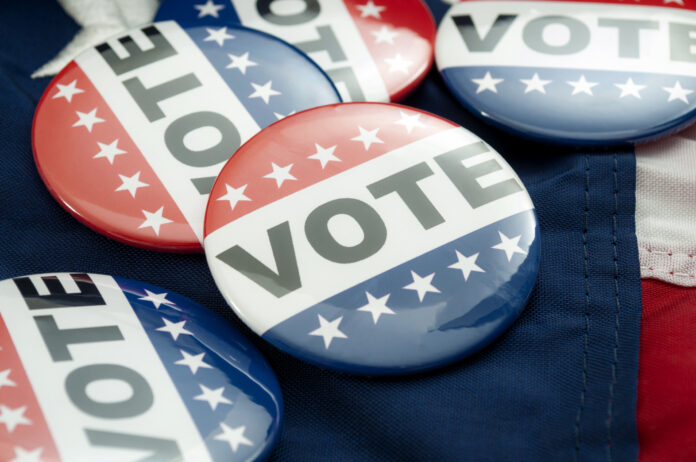Life, Liberty, Property #72: what’s at stake in the 2024 elections is policies that attempt to ensure equality of outcomes versus merit.
by S.T. Karnick
IN THIS ISSUE:
- What’s at Stake in the 2024 Elections
- Seattle’s Criminal Budget Problems
- Cleveland Browns Owners Push for Stadium Deal
- Cartoon
 What’s at Stake in the 2024 Elections
What’s at Stake in the 2024 Elections
At present, it appears that the 2024 elections, especially for the presidency, will have an unusually strong focus on policy. That may seem unlikely given the rather comically vivid characters vying for president and vice president. It is nonetheless true. Harris will run as the abortion candidate, and Trump will run on the economy.
The vice president’s expected emphasis on health care (with abortion as the central element of that) and dismissal of economic troubles caused by the Biden administration is meant to highlight the Democrats’ and political left’s goal of greater equality among the common people (with elites to be set aside as a protected class) via redistribution of wealth (in this case, access to medical care) and the erasure of natural causes of differing economic outcomes (through abortion and other anti-family initiatives).
Trump’s emphasis on the economy centers on inflation and immigration, and it highlights Republicans’ and the political right’s interest in material improvement through private initiative, increasing employment of native-born Americans, family formation, and energy production, with differing individual outcomes accepted as a necessary consequence of freedom and with government control to be pared back as needed.
Thus, Harris has launched her campaign with an emphasis on her support for abortion and has tied Trump to restrictions many of his supporters hope to accomplish.
“We who believe in reproductive freedom will stop Donald Trump’s extreme abortion bans,” Harris said at a July campaign event in Georgia. “And when Congress passes a law to restore reproductive freedoms, as president of the United States, I will sign it into law.”
Trump has stressed that the Supreme Court’s 2022 Dobbs v. Jackson decision to return the abortion issue to the states is exactly what the pro-life movement had been advocating for five decades and which Trump still supports. “My view is now that we have abortion where everybody wanted it from a legal standpoint, the states will determine by vote or legislation or perhaps both,” Trump said in a video in April. “And whatever they decide must be the law of the land—in this case, the law of the state.”
Harris, by contrast, wants uniform national protection for abortion up to the moment of birth. “We need to put into law the protections of Roe v. Wade,” Harris said in a September interview with Face the Nation. “And that is about going back to where we were before the Dobbs decision.”
Harris has hammered that point home by repeatedly saying “We’re not going back!” to the pre-Roe state-based system. Harris’s team and the press have expanded the implications of that catchphrase into a rejection of Trump’s “Make America Great Again” pitch: “Truly, this campaign is about two very different visions for our nation: one focused on the future, the other focused on the past,” Harris said at an Atlanta rally on July 31.
The campaign is definitely “about two very different visions for our nation.”
Both teams apparently see health care as powerfully representative of the differences. The two candidates have harshly criticized each other’s approach to the issue. As CNN reported on July 31,
“She wants to outlaw private health insurance,” Trump said Friday at the conservative Turning Point Action’s Believers’ Summit in West Palm Beach, Florida. “A lot of people have private health insurance. They want to keep it that way. It’s phenomenal.”
The next day, Harris said at a fundraising event in Pittsfield, Massachusetts: “He intends to end the Affordable Care Act and take us back to a time when insurance companies had the power to deny people with preexisting conditions. You guys remember what that was? It was real. Children with asthma. Breast cancer survivors. Grandparents with diabetes.”
Trump’s criticism of Harris refers to her 2016 support of Medicare for All, which would quickly evolve into government-controlled socialized medicine. Harris’s criticism of Trump on Obamacare refers to his 2016 promise to repeal the Affordable Care Act and replace it with a more market-friendly system. Both candidates have repudiated those positions in the years since.
Trump’s criticisms of the Biden administration on inflation and immigration have been well-documented and proved highly effective before the president withdrew from the race and endorsed Harris to replace him. Trump’s consistent position has been that the Biden-Harris approach to the economy concentrates power and money in government and government-favored big businesses to the detriment of the American worker. Inflation, high housing costs, and loss of the nation’s manufacturing base have greatly increased the burdens on American workers and retirees during the Biden administration, Trump argues. Harris’s reply is that tax cuts would benefit the rich, who should be taxed more, not less, she says.
In discussing their respective records, Harris emphasizes aspirations, and Trump highlights results.
The emphasis on aspirations and the consequent need to break eggs (i.e., people) regularly is the essence of leftism and has been pursued across the world for nearly a quarter-millennium, with the goal being a social-Marxist utopia run by expert intellectuals with full authority over everything people do, offering complete freedom to do exactly what the government dictates you may do.
Harris and Gov. Tim Walz represent this worldview superbly: government good, markets bad; economic redistribution good, meritocracy bad; government spending good, individual choices bad; high taxes good, low taxes bad; regulation good, business and consumer discretion bad; freedom for criminals good, rule of law bad; government destruction of political opponents good, opposition to government decisions bad; government secrecy good, government transparency bad; censorship good, freedom of speech bad; emptying jails good, legal ownership of firearms bad; Earth good, people bad; subsidized green energy good, unsubsidized manufacturing bad; women good, men bad; Democrats good, Republicans bad.
Also: government health care good, private health care bad; abortion good, family bad; coastal people good (even if living in Republican-controlled states), heartland people bad; white-collar people good, blue-collar people bad; marijuana good, tobacco bad; immigrants good, America-firsters bad; education uniformity good, education choice bad; teachers unions good, parents and taxpayers bad; indoctrination good, education bad; drag queens good, Christian ministers bad; atheists and Muslims good, Jews and Christians bad; race riots good, anti-government protests bad; anti-Israel riots good, harshly worded tweets bad; moral relativism good, moral probity bad; Derrida good, Aristotle bad (for the philosophically inclined), and so on.
For those who support Trump and Vance, a simple reversal of those evaluations is largely appropriate.
Note that I am being fair here. If the descriptions of the two approaches to governance indicate that sensible people should favor one over the other, that results from the nature of the two positions, not my account of them. The biggest offense to be found in stating the two positions accurately and without euphemism is that it disadvantages the political approach that relies on falsehoods, obfuscation, and ambiguity to gain public acceptance.
This revolutionary agenda reached a fever pitch in the United States during the presidency of Barack Obama and expanded under that of Obama cat’s-paw Biden.
Harris represents a continuation of the current national trajectory, as one would expect from a sitting vice president running for the presidency. Trump embodies a reversal of the powerful changes in the national identity imposed by the Obama and Biden administrations. Both current candidates for president are calling for change, but of very different kinds. Harris wants to continue the “fundamental transformation” of the United States away from its traditional ways and especially its protections of individual liberty. Trump wants to reestablish the relatively decentralized political and economic order of the nation’s past, before the Progressive Era of the late 1890s and early 1900s.
In short, the central issue of this election is the concentration of power.
An alarmingly large majority of American leaders—at all levels of government and in the nation’s ostensibly private but government-dominated institutions—has engaged in a decades-long crusade for forced equality among the people. In my view, they have done this not for selfless reasons but to eliminate potential rivals for power by removing the rungs from the top half of the economic and social ladders, and removing other rungs as needed. The rails of the ladder are now lying on the ground, rotting.
This effort has continually struggled against two massive obstacles: differences among people in their natural abilities, and differences among people in their personal morality.
The penetration of the nation’s institutions has created a political-financial-social regime dedicated to destruction of the old order as a means of overcoming these impediments. This regime has attempted to overpower the differences in natural abilities by destroying the system of merit by which all reasonable human groups order themselves and replacing it with state power. This transformation has been implemented through the welfare state and the “new Constitution,” based on group identities via statutory elimination of freedom of association, as Christopher Caldwell astutely observed in his groundbreaking book The Age of Entitlement: America Since the Sixties. It is both a manifestation of and the attempted reification of all the “good” ideas mentioned above.
Meanwhile, the state has attempted to overcome differences in morality by undermining the ethical precepts and willingness for personal sacrifice that lead to individual success—because that is relatively easy to accomplish and highly effective, whereas the replacement of self- and other-destructive attitudes is exceedingly difficult and can never be complete, regardless of effort, because human beings are naturally equipped with individual wills that aspire to the satisfaction of a variety of personal desires. It is easier to bring people’s morals down than to raise them. Just ask any parent.
The purported universal equality will be, as many have said before, an equality of poverty for all but those privileged by the state. The poverty, I would add, will be not only material but also, and in fact fundamentally, spiritual. The destruction of the human spirit is a necessary component of the attempt at forcible perfection of humanity. That has been true of every revolutionary attempt to impose authoritarian rule “for the good of the people.” It always turns out to be necessary to destroy the people in order to save them.
That is the real difference between the two political programs before us.
Source: CNN
 Seattle’s Criminal Budget Problems
Seattle’s Criminal Budget Problems
Crime does not pay for urban governments, however much leftist lawmakers and Soros-backed prosecutors would like you to think so.
The city of Seattle, Washington, is paying a big price for defunding its police, emptying its jails, deciding not to prosecute criminals, and letting homeless people run free (or stagger free or lie in drug-induced comas free, as the case may be). The Seattle Times reports:
Seattle’s budget lift this fall is looking heavier, according to a new economic forecast, as commercial and sales taxes continue to drag down the city’s overall financial picture.
Taken together, the city is likely to add another $7 million to its budget deficit next year, bringing the total to more than $260 million in 2025.
Businesses cannot operate where crime is rampant, Seattle radio station KTTH 770 notes:
As one of downtown’s busiest Starbucks temporarily closed its doors over safety concerns, prominent members of the Seattle business community are speaking out forcefully and publicly about the continuing crime and homelessness crises. They’re setting their [sights] on King County Executive Dow Constantine.
“Why do we continue to tolerate these open-air drug markets downtown at Third & Pike/Pine and Third and James/Yesler?” Patrick Foley, co-founder and managing partner at Lake Union Partners, wrote on LinkedIn before unloading on Constantine.
“This man has purposely kept the downtown jail staffing at COVID levels (roughly 50% capacity) not out of necessity, but because he believes people dealing and consuming fentanyl out in the open, passed out on our sidewalks, smashing windows, starting fires, using the streets as a bathroom, and stealing from stores like Target and Nordstrom don’t belong in jail or some form of forced treatment,” he wrote.
Constantine is not allowing the King County jail to accept most criminal bookings. While the jail is in the middle of a staffing crisis, the King County Corrections Guild President Dennis Folk exclusively told “The Jason Rantz Show” on KTTH that Constantine is “intentionally” keeping staffing low for ideological reasons. Constantine is also trying to permanently close the King County juvenile detention center.
The city’s neglect of the homeless is bad for everyone, KTTH notes:
Jeffery Judson-Baker, the Investment Manager at the same firm, also criticized Constantine for the mess in downtown Seattle.
“Our misplaced compassion for the unhoused has turned into neglect, leaving addicts to rot in doorways and the mentally ill to suffer on the streets,” Judson-Baker wrote on LinkedIn. “Political complacency, typified by leaders like Dow Constantine, only exacerbates these issues. We need more than empty promises and half-measures; we need decisive action to treat the unhoused, clean up our streets, and restore Seattle’s health.”
The destruction of rule of law and the neglect of property rights lead to ever-worsening conditions, KTTH notes:
Downtown Seattle has recently experienced a series of high-profile stories of businesses exiting the neighborhood.
Lululemon, Fox’s Seattle jeweler, PCC Community Markets flagship store and North Face all closed their doors over the crime and homelessness crisis stifling downtown’s post-COVID economic recovery. With homeless addicts passed out on sidewalks and in front of business storefronts, foot traffic has stalled dramatically for businesses.
“Walking downtown is embarrassing. The drug addiction and mental health crises are glaringly apparent,” Judson-Baker wrote in an open letter. “Stepping off the light rail near my home in Pioneer Square or in Westlake Center, I see drug addicts folded in half and manic episodes untreated. Commuters step over needles, trash, and human waste. Many favorite restaurants and shops remain boarded up. Once vibrant, downtown Seattle now can feel at times like a wasteland.”
As businesses and residents leave, the tax base deteriorates. That is exactly what is happening in Seattle. As the Seattle Times reports,
Employment growth in Seattle has lagged the national average as unemployment has crept up more quickly here than in the rest of the country. Over the last 12 months, the region has barely added any jobs, according to a Monday morning presentation from the city’s Economic and Revenue Forecast Council.
At the same time, demand for office space was down in the second quarter of this year from the first. For a city heavily reliant on sales, business and occupation and real estate transaction taxes, the slowing market for commercial space and lackluster employment landscape is enough to squeeze Seattle’s budget.
The consequent reduction of the city’s tax base cuts government revenues and necessitates further reductions in city services, which worsens conditions even more. That leads to a downward spiral of service cuts and revenue shortfalls.
The only solution, as we have noted before, is the restoration of law and order. The destruction of Seattle is a triumph of ideology over reality.
Sources: Seattle Times; KTTH 770
 Cleveland Browns Owners Push for Stadium Deal
Cleveland Browns Owners Push for Stadium Deal
The National Football League’s Cleveland Browns are asking the city to approve a plan to build a $2.4 billion domed stadium for the team, with the costs split 50-50 between public and private sources.
The Browns have made the playoffs twice in the last 21 years. The team made a rare visit to the playoffs last year, losing their only game, and therefore feel emboldened to ask for more than a billion dollars from the taxpayers, in a letter from Browns owners Dee and Jimmy Haslam:
With Mayor Bibb releasing the City’s latest proposal for a renovated stadium last week and the increased community dialogue around our stadium future, including the possibility of a dome stadium in Brook Park, we feel it is the appropriate time for us to communicate directly and share an update on our stadium process. We are currently evaluating the City’s proposal and have requested additional information from the City to enable us to comprehensively do so.
The city’s offer was a meager $461 million for stadium renovations, SportsPro Media reports:
[T]he city of Cleveland presented the Browns with a proposal to renovate their [current] stadium to keep the NFL team downtown on a 30-year lease extension. Cleveland’s submission included US$461 million from the city, US$227 million of which would come from a tax increase on tickets.
If I were a Cleveland taxpayer, I’d be rooting against the Browns this year. A paltry $461 million might look pretty enticing to the Haslams after a 3-14 season. Or perhaps the owners would decide to move the team to another city. That would be the biggest win of all for the taxpayers.
Source: TV-19 Cleveland; SportsPro Media
Cartoon
For more Rights, Justice, and Culture News.
For more Budget & Tax News.
For more from The Heartland Institute.












